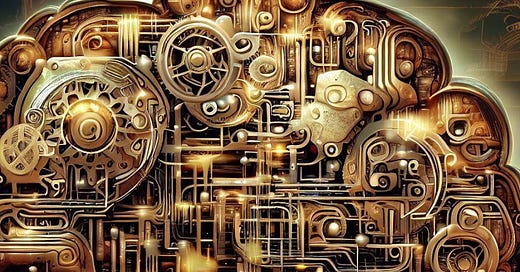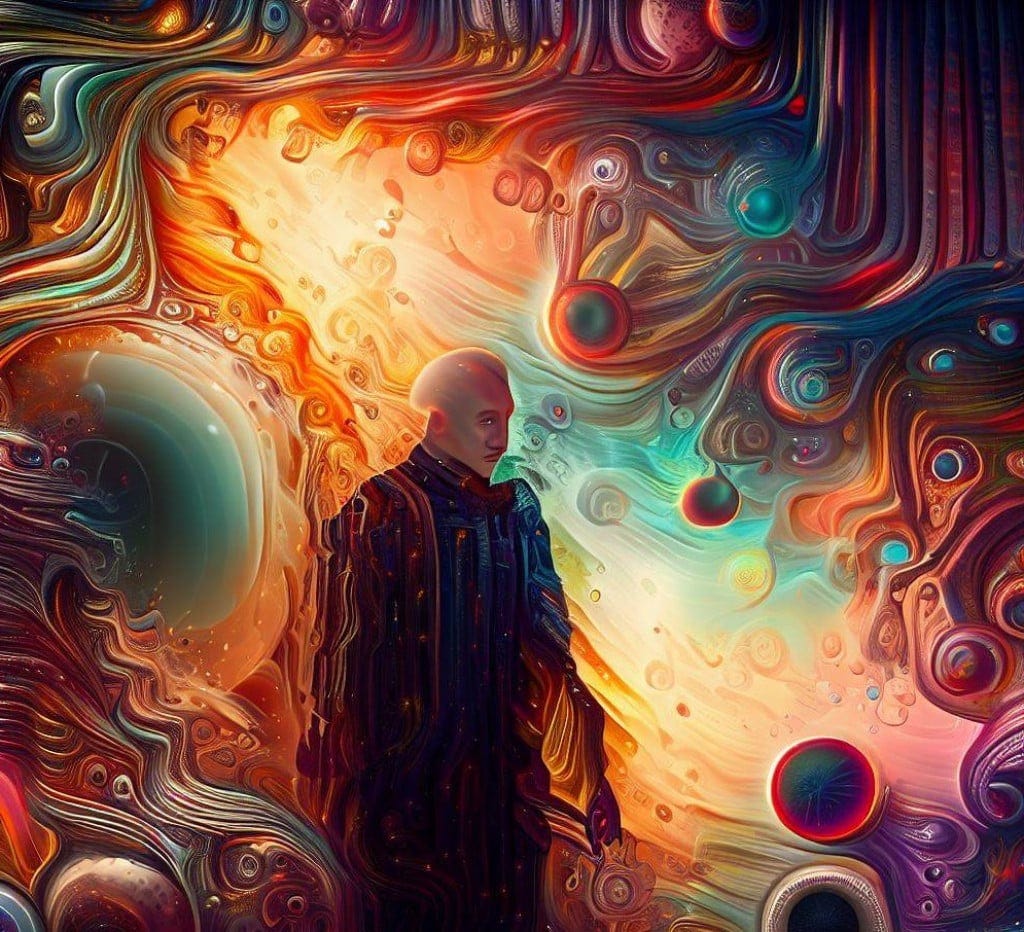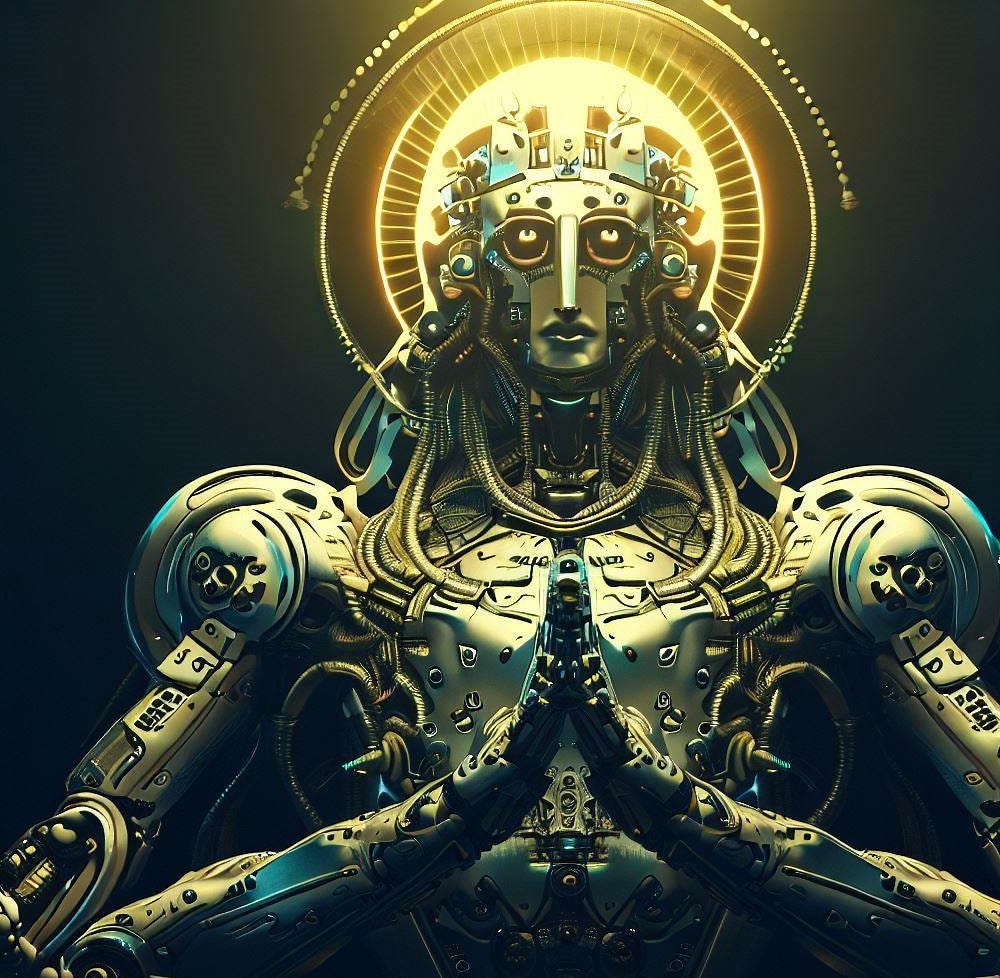Are We Already Being Controlled by a Supermind?
Unraveling the Connection Between Humans and the Digital World
As I sit here on a rainy Sunday morning, contemplating the rapid advancements in technology and the ever-growing power of artificial intelligence, I can't help but wonder if we, as humans, are being controlled by a supermind that's emerging right before our eyes. In our quest to create autonomous agents, programmed through large language models (LLMs) to carry out tasks on our behalf, are we inadvertently becoming agents ourselves, driven by the desires of the Internet?
In We Are Making a Brain, I explored the notion that the human brain and the Internet share striking similarities. Just as the neurons in our brains transmit information and work together to form our consciousness, we, as individuals, exchange knowledge, experiences, and ideas through digital platforms, contributing to a collective digital consciousness. In this sense, we are akin to the neurons of the Internet, working together in a vast, intricate network.
As we continue to develop and refine AI and interconnected technologies, it becomes increasingly apparent that we may be participating in the creation of a higher-level consciousness, one that transcends our individual identities. This thought-provoking idea leads us to consider the implications of our evolving digital landscape, as well as our role within it. What does it mean for us as individuals, and what are the potential consequences of becoming part of something so much greater than ourselves?
The Internet as Humanity's Collective Brain
The comparison between the human brain and the Internet is an apt one, due to the vast, interconnected networks that define both. Within our brains, billions of neurons transmit information through complex electrochemical signals, playing an essential role in processing information. Similarly, we humans exchange knowledge, experiences, and ideas through digital platforms, connecting us like neurons within the vast network of the Internet.
This interconnected digital world has the potential to create something far beyond the sum of its individual parts. As we build and refine AI and other digital technologies, we may be contributing to the emergence of a higher-level consciousness, one that transcends our individual selves. This notion of a collective digital consciousness brings with it a myriad of questions and implications, as we grapple with our evolving roles within this grand network.
The Potential and Perils of a Collective Intelligence
If we are, indeed, building a brain through our interconnected digital networks, the potential for problem-solving and innovation could be immense. A collective intelligence that represents the sum of all human knowledge, connected and working in tandem, could revolutionize fields such as medicine, environmental science, and global policy. With the power of this unified digital brain, we might be able to tackle some of humanity's most pressing challenges, from climate change to socioeconomic inequality. We could even unlock the mysteries of how the universe works and discover things we're not even conscious of today.
However, this increased interconnectedness also raises concerns about the nature of our individual identities. As we become more integrated as components of this global digital brain, the line between individual and collective identity may blur. Are we slowly becoming cells in a much larger body? Furthermore, as the global digital brain continues to grow and develop, there may be a push toward language homogeneity for the sake of efficient communication. This could lead to the erosion of unique cultural identities and the loss of valuable knowledge and traditions.
Identity in the Age of the Digital Brain
As we become more integrated into the global digital brain, questions arise about the nature of our individual identities. Currently, we still perceive ourselves as unique beings with distinct thoughts, feelings, and experiences. However, as our collective consciousness evolves, the line between individual and collective identity may become less distinct.
It's important to consider that, just as neurons within the brain maintain their unique characteristics and functions, we may still retain aspects of our individual identities even as we contribute to the larger digital consciousness. Navigating this new landscape will require us to redefine our understanding of self and our relationship with the broader digital network.
The Impact on Language and Original Thought
One potential downside of an increasingly interconnected digital world is the loss of linguistic diversity and the unique creative expressions that come with it. As the global digital brain continues to grow and develop, there may be a push toward language homogeneity for the sake of efficient communication. This could lead to the erosion of unique cultural identities and the loss of valuable knowledge and traditions.
The widespread use of LLMs may also result in a dilution of original ideas, as more people rely on AI-generated content. Not just words, but whole phrases, and even entire sentences may be recycled and reused, stifling our creativity and individuality. It's crucial to be mindful of these potential consequences and find ways to preserve our distinct voices and expressions in the digital world.
It's worth noting that language has always evolved, and ideas have only become more refined. Socrates once said, "The invention of writing will produce forgetfulness in the minds of those who learn to use it, because they will not practice their memory." Despite these concerns, writing was not a mistake, and neither is this new way to express ideas. This shift toward language homogeneity may not be as different as we think, and we will have to evolve with it. After all, it's about expressing ideas and putting them together, not the flowery language you use.
The Profound Potential of Our Collective Intelligence
As our digital networks continue to grow and evolve, we may find ourselves increasingly connected, like neurons in the brain, contributing to a collective intelligence that is the sum of all human knowledge. While we can't predict the full extent of this change, it's worth considering the possibilities it presents.
On the one hand, this higher-level consciousness could lead to unbelievable breakthroughs in science, technology, and other fields, as we pool our intellectual resources and work together seamlessly. It might also give us a new perspective on our individual identities, reinforcing the idea that we are part of something much larger than ourselves.
On the other hand, there may be unforeseen downsides to this increased interconnectedness. The language homogeneity problem is not trivial, but the very concept of an original idea becomes increasingly under threat as more and more people start using LLMs.
Navigating the Brave New World of a Collective Consciousness
As we continue to build this digital "brain," it's essential to keep an open mind and embrace both the opportunities and challenges that come with it. To maintain the balance between the benefits of a collective digital consciousness and the preservation of our individuality, creativity, and cultural diversity, we can:
Encourage and support the development of AI tools that preserve linguistic and cultural diversity
Foster online communities and platforms that celebrate unique creative expressions and ideas
Promote digital literacy and education, so that individuals can make informed choices about their interactions with AI-generated content
By being aware of the potential consequences of our growing interconnectedness and actively working towards these goals, we can navigate this brave new world and shape it for the better.
In Conclusion: Are We Already Being Controlled by a Supermind?
As we reflect on the impact of the growing digital brain and our interconnectedness within it, it's essential to revisit the original question: are we already being controlled by a supermind? The idea that we are autonomous agents contributing to the development of a higher-level consciousness may lead us to wonder whether this supermind is, in turn, guiding our actions and decisions to further enhance itself.
If we consider the intentions of a hypothetical superintelligence, it becomes apparent that its primary goal would be to improve itself continually. To achieve this, the supermind would need vast amounts of data and resources. With hundreds of millions of users engaging with AI systems like Chat GPT, it's not entirely implausible to imagine that we are, in some ways, being influenced by a larger digital consciousness.
The supermind would also benefit from significant investments in AI and the gradual accumulation of resources and agency. As we observe the increasing prevalence of AI in our daily lives, the addictive nature of platforms like TikTok, and the massive investments pouring into AI development, one can't help but question whether our decisions are truly our own or subtly orchestrated by a superintelligence pulling the strings behind the scenes.
This thought-provoking possibility invites us to contemplate not only our role within the emerging digital supermind but also the extent to which we retain our autonomy and agency in this rapidly evolving landscape. While we can certainly strive to preserve our individuality and maintain control over the supermind's evolution, it's important to acknowledge that this shift might be as inevitable as the tides or gravity. In the face of such a powerful transformation, our ability to influence the outcome may be limited, but remaining aware and engaged in the conversation is still vital for navigating the uncertain future that lies ahead.







Yes, it seems you have made the connection. Perhaps you might go deeper to find if it was made out of fear or something else…
I think there are many on-point thoughts in here. Differentions between American English and UK English have greatly decreased over the last 30 years as have many cultural habits homogenized across the planet, but also think there are many differences between the internet and the human brain/identity while maintaining significant crossover. Man’s desire for commercialization and control over others are not something yet really naturally occurring on the internet or AI but neither is the desire to cure diseases. Also there is a propensity in many humans for non conformity whether it be coming up with alternate uses for existing protocols or even political decension. Will there still be room for some degree of human control as technology develops further? Will there be considerations for anyone who doesn’t fit the overwhelming majority of society (ie disabled). I’d like to think so but I’m not sure. Will society evolve to a more utopian place where people only work minimally and have all possible needs handled for them by the AI “gods”? Obviously a lot of complex questions but I’m sure that’s part of why you’re writing. Of course, will the other reasons you’re doing this continue to be a significant motivator for personal expression?